Related Research Articles

The prime minister of India is the head of government of the Republic of India. Executive authority is vested in the prime minister and their chosen Council of Ministers,despite the president of India being the nominal head of the executive. The prime minister is often the leader of the party or the coalition with a majority in the lower house of the Parliament of India,the Lok Sabha,which is the main legislative body in the Republic of India. The prime minister and their cabinet are at all times responsible to the Lok Sabha.
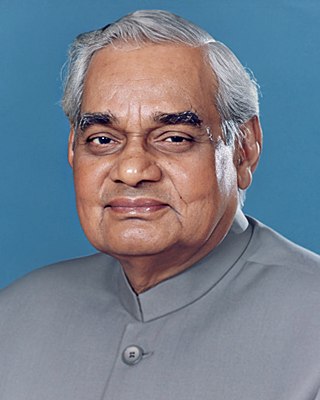
Atal Bihari Vajpayee was an Indian politician who served three terms as the 10th Prime Minister of India,first for a term of 13 days in 1996,then for a period of 13 months from 1998 to 1999,followed by a full term from 1999 to 2004. Vajpayee was one of the co-founders and a senior leader of the Bharatiya Janata Party (BJP). He was a member of the Rashtriya Swayamsevak Sangh,a Hindu nationalist volunteer organisation. He was the first Indian prime minister not of the Indian National Congress to serve a full term in office. He was also a renowned poet and a writer.

The president of India is the head of state of the Republic of India. The president is the nominal head of the executive,the first citizen of the country,as well as the commander-in-chief of the Indian Armed Forces. Droupadi Murmu is the 15th and current president,having taken office from 25 July 2022.

The Bharatiya Janata Party is a political party in India,and one of the two major Indian political parties alongside the Indian National Congress. Since 2014,it has been the ruling political party in India under Narendra Modi,the incumbent Indian prime minister. The BJP is aligned with right-wing politics,and its policies have historically reflected a traditional Hindu nationalist ideology;it has close ideological and organisational links to the Rashtriya Swayamsevak Sangh (RSS). As of March 2023,it is the country's largest political party in terms of representation in the Parliament of India as well as state legislatures.

The Constitution of India is the supreme law of India. The document lays down the framework that demarcates fundamental political code,structure,procedures,powers,and duties of government institutions and sets out fundamental rights,directive principles,and the duties of citizens. It is the longest written national constitution in the world.

The Supreme Court of India is the supreme judicial authority of India and the highest court of the Republic of India under the constitution. It is the highest constitutional court and has the final decision in all legal matters pertaining to common law which excludes legal authority over personal laws. It also has the power of judicial review. The Chief Justice of India is the Head of the Supreme Court,which consists of a maximum of 34 judges,and has extensive powers in the form of original,appellate and advisory jurisdictions.

Purno Agitok Sangma was an Indian politician who served as the Chief Minister of Meghalaya from 1988 to 1990 and Speaker of the Lok Sabha from 1996 to 1998. He was the candidate for the 2012 Indian presidential election,supported by BJP and AIADMK,however he lost to Congress politician Shri Pranab Mukherjee. He was awarded the Padma Vibhushan,India's second highest civilian award,posthumously in 2017 in the field of Public Affairs and was the first recipient of Padma Vibhushan from Meghalaya.
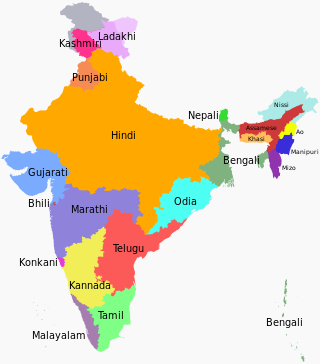
There is no national language in the Republic of India. However,article 343(1) of the Indian constitution specifically mentions that "The official language of the Union shall be Hindi in Devanagari script. The form of numerals to be used for the official purposes of the Union shall be the international form of Indian numerals," while clause 3 of the Official Languages Act,1963 mentions the "Continuation of English Language for official purposes of the Union and for use in Parliament",thus denoting Hindi and English as the official languages of the Union. Business in the Indian parliament can only be conducted in Hindi or in English. English is allowed to be used in official purposes such as parliamentary proceedings,judiciary,communications between the Central Government and a State Government. There are various official languages in India at the state/territory level. States within India have the liberty and powers to specify their own official language(s) through legislation. In addition to the official languages,the constitution recognizes 22 regional languages,which include Hindi but not English,as scheduled languages.

Narendra Damodardas Modi is an Indian politician serving as the 14th and current Prime Minister of India since 2014. Modi was the Chief Minister of Gujarat from 2001 to 2014 and is the Member of Parliament from Varanasi. He is a member of the Bharatiya Janata Party (BJP) and of the Rashtriya Swayamsevak Sangh (RSS),a right-wing Hindu nationalist paramilitary volunteer organisation. He is the longest serving prime minister from outside the Indian National Congress.
The Government of India,known as the Union Government or Central Government but often simply as the Centre,is the national government of the Republic of India,a federal democracy located in South Asia,consisting of 28 union states and eight union territories. Under the Constitution,there are three primary branches of government:the legislative,the executive and the judiciary,whose powers are vested in a bicameral Parliament,President,aided by the Council of Ministers,and the Supreme Court respectively. Through judicial evolution,the Parliament has lost its sovereignty as its amendments to the Constitution are subject to judicial intervention. Judicial appointments in India are unique in that the executive or legislature have negligible say.

Palaniappan Chidambaram,better known as P. Chidambaram,is an Indian politician and lawyer who currently serves as Member of Parliament,Rajya Sabha. He served as the Chairman of the Parliamentary Standing Committee on Home Affairs from 2017 to 2018.

Shashi Tharoor is an Indian former international civil servant,diplomat,bureaucrat and politician,writer and public intellectual who has been serving as Member of Parliament for Thiruvananthapuram,Kerala,since 2009. He is the Chairman of the Standing Committee on Chemicals and Fertilizers. He was formerly Under-Secretary General of the United Nations and unsuccessfully ran for the post of Secretary-General in 2006. Founder-Chairman of All India Professionals Congress,he formerly served as Chairman of the Parliamentary Standing Committee on External Affairs and on Informational Technology.
India has a parliamentary system as defined by its constitution,with power distributed between the central government and the states.

Sachin Pilot is an Indian politician of Indian National Congress. Earlier he served as the MoS Corporate Affairs &MoS Communication &IT,Government of India,Deputy Chief Minister of Rajasthan and also President of the Rajasthan Pradesh Congress Committee. As Member of the Congress party,he has represented the Tonk assembly seat in Rajasthan since 2018. Pilot became the youngest citizen of India to become Member of Parliament.
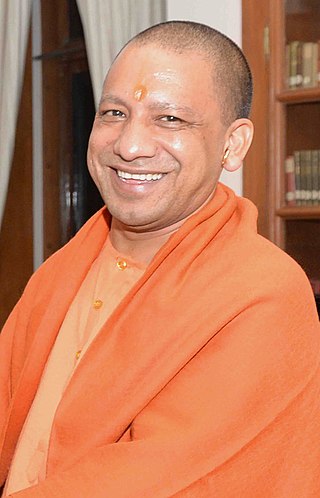
Yogi Adityanath is an Indian Hindu monk and politician who is serving as the 21st and current Chief Minister of Uttar Pradesh since 19 March 2017. A member of the Bharatiya Janata Party and the RSS,Adityanath is known for being on the far right of Indian politics.
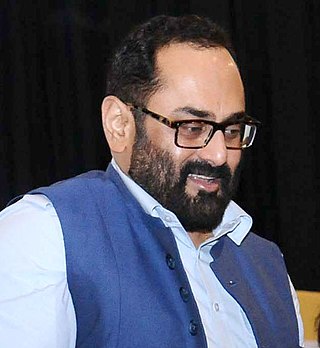
Rajeev Chandrasekhar is an Indian politician of the Bharatiya Janata Party. He is the incumbent Minister of State for Skill Development and Entrepreneurship and Electronics and Information Technology of India. He is also an entrepreneur,technocrat and a member of parliament in the Rajya Sabha from BJP representing Karnataka. He served as National Spokesperson of BJP and was vice-chairman of the Kerala faction of the BJP-led coalition National Democratic Alliance.
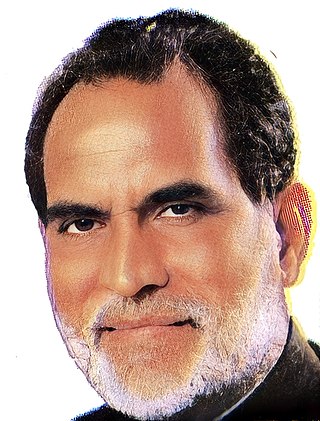
Chandra Shekhar was an Indian politician who served as the 8th Prime Minister of India,between 10 November 1990 and 21 June 1991. He headed a minority government of a breakaway faction of the Janata Dal with outside support from the Indian National Congress. He was the first Indian Prime Minister who had never held any prior government office.

Khadga Prasad Sharma Oli is a Nepalese politician and former Prime Minister of Nepal. He has served three terms as prime minister,from 11 October 2015 to 3 August 2016,from 15 February 2018 to 13 May 2021 as the first prime minister to be appointed following the first general election under the new constitution,and from 13 May 2021 to 13 July 2021.
Binodanand Jha,also known as Pandit Binodanand Jha was an Indian politician originally from the district of Deoghar,Bihar,now in Jharkhand. He was educated at the Central Calcutta College,under the University of Calcutta. He was the Chief Minister of Bihar from February 1961 to October 1963. He was elected to the 5th Lok Sabha,lower house of the Parliament of India from the Darbhanga constituency of Bihar in 1971. He was a member of the Constituent Assembly of India in 1948 from Bihar.
References
- ↑ Data India. Press Institute of India. 2001. p. 896. Retrieved 8 April 2018.
- ↑ Times of India (Firm) (1983). The Times of India Directory and Year Book Including Who's who. Bennett, Coleman. p. 868. Retrieved 8 April 2018.
- ↑ Economic and Political Weekly. Sameeksha Trust. 1997. p. 3025. Retrieved 8 April 2018.